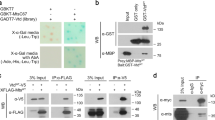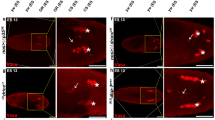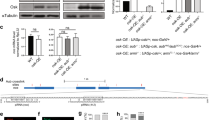Abstract
The genes okra and spindle-B act during meiosis in Drosophila to repair double-stranded DNA breaks (DSBs) associated with meiotic recombination. Unexpectedly, mutations in these genes cause dorsoventral patterning defects during oogenesis. These defects result from a failure to accumulate Gurken protein, which is required to initiate dorsoventral patterning during oogenesis. Here we find that the block in Gurken accumulation in the oocyte cytoplasm reflects activation of a meiotic checkpoint in response to the persistence of DSBs in the nucleus. We also show that Vasa is a target of this meiotic checkpoint, and so may mediate the checkpoint-dependent translational regulation of Gurken.
This is a preview of subscription content, access via your institution
Access options
Subscribe to this journal
Receive 12 print issues and online access
$209.00 per year
only $17.42 per issue
Buy this article
- Purchase on Springer Link
- Instant access to full article PDF
Prices may be subject to local taxes which are calculated during checkout




Similar content being viewed by others
References
Ghabrial, A., Ray, R. P. & Schupbach, T. okra and spindle-B encode components of the RAD52 DNA repair pathway and affect meiosis and patterning in Drosophila oogenesis. Genes Dev. 12, 2711– 2723 (1998).
Gonzalez-Reyes, A., Elliott, H. & St Johnston, D. Oocyte determination and the origin of polarity in Drosophila: the role of the spindle genes. Development 124, 4927–4937 ( 1997).
Ray, R. P. & Schüpbach, T. Intercellular signaling and the polarization of body axes during Drosophila oogenesis. Genes Dev. 10, 1711–1723 (1996).
Styhler, S. et al. vasa is required for Gurken accumulation in the oocyte, and is involved in oocyte differentiation and germline cyst development. Development 125, 1569–1578 (1998).
Tomancak, P., Guichet, A., Zavorszky, P. & Ephrussi, A. Oocyte polarity depends on regulation of gurken by vasa. Development 125, 1723–1732 (1998).
Kooistra, R. et al. The Drosophila melanogaster RAD54 homolog, DmRAD54 , is involved in the repair of radiation damage and recombination. Mol. Cell. Biol. 17, 6097–6104 (1997).
Boyd, J. B., Golino, M. D., Shaw, K. E., Osgood, C. J. & Green, M. M. Third-chromosome mutagen-sensitive mutants of Drosophila melanogaster. Genetics 97, 607–623 (1981).
Petukhova, G., Stratton, S. & Sung, P. Catalysis of homologous DNA pairing by yeast Rad51 and Rad54 proteins. Nature 393, 91– 94 (1998).
Roeder, G. S. Meiotic chromosomes: it takes two to tango. Genes Dev. 11, 2600–2621 (1997).
Keeney, S., Giroux, C. N. & Kleckner, N. Meiosis-specific DNA double-strand breaks are catalyzed by Spo11, a member of a widely conserved protein family. Cell 88, 375–384 (1997).
Cao, L., Alani, E. & Kleckner, N. A pathway for generation and processing of double-strand breaks during meiotic recombination in S. cerevisiae. Cell 61, 1089–1101 ( 1990).
McKim, K. S. & Hayashi-Hagihara, A. mei-W68 in Drosophila melanogaster encodes a Spo11 homolog: evidence that the mechanism for initiating meiotic recombination is conserved. Genes Dev. 12, 2932–2942 (1998).
McKim, K. S. et al. Meiotic synapsis in the absence of recombination. Science 279, 876–878 ( 1998).
Gowen, J. W. Meiosis as a genetic character in Drosophila melanogaster. J. Exp. Zool. 65, 83–106 ( 1933).
Bishop, D. K., Park, D., Xu, L. & Kleckner, N. DMC1: a meiosis-specific yeast homolog of E. coli recA required for recombination synaptonemal complex formation and cell cycle progression. Cell 69, 439–456 ( 1992).
Pittman, D. L. et al. Meiotic prophase arrest with failure of chromosome synapsis in mice deficient for Dmc1, a germline-specific RecA homolog. Mol. Cell 1, 697–705 ( 1998).
Lydall, D., Nikolsky, Y., Bishop, D. K. & Weinert, T. A meiotic recombination checkpoint controlled by mitotic checkpoint genes . Nature 383, 840–843 (1996).
Sekelsky, J. J., Burtis, K. C. & Hawley, R. S. Damage control: the pleiotropy of DNA repair genes in Drosophila melanogaster. Genetics 148, 1587–1598 (1998).
Sibon, O. C. M., Laurencon, A., Hawley, R. S. & Theurkauf, W. E. The Drosophila ATM homologue Mei-41 has an essential checkpoint function at the midblastula transition. Curr. Biol. 9, 302–312 (1999).
Bentley, N. J. & Carr, A. M. DNA structure-dependent checkpoints in model systems. Biol. Chem. 378, 1267–1274 (1997).
Lasko, P. F. & Ashburner, M. The product of the Drosophila gene vasa is very similar to eukaryotic initiation factor-4A. Nature 335, 611–617 ( 1988).
Chu, S. & Herskowitz, I. Gametogenesis in yeast is regulated by a transcriptional cascade dependent on Ndt80. Mol. Cell 1, 685–696 (1998).
Buelt, M. K., Glidden, B. J. & Storm, D. R. Regulation of p68 RNA helicase by calmodulin and protein kinase C. J. Biol. Chem. 269, 29367 –29370 (1994).
Gallie, D. R. et al. The phosphorylation state of translation initiation factors is regulated developmentally and following heat shock in wheat. J. Biol. Chem. 272, 1046–1053 (1997).
Webster, C. et al. Hypoxia enhances phosphorylation of eukaryotic initiation factor 4A in maize root tips. J. Biol. Chem. 266, 23341–23346 (1991).
Olsen, L. C., Aasland, R. & Fjose, A. A vasa-like gene in zebrafish identifies putative primordial germ cells. Mech. Dev. 66, 95 –105 (1997).
Lindsley, D. L. & Zimm, G. G. The Genome of Drosophila melanogaster (Academic, New York, 1992).
Gavis, E. R. & Lehmann, R. Translational regulation of nanos by RNA localization. Nature 369, 315– 318 (1994).
Whalen, A. M. & Steward, R. Dissociation of the Dorsal-Cactus complex and phosphorylation of the Dorsal protein correlate with the nuclear localization of Dorsal. J. Cell Biol. 3, 523–534 (1993).
Spradling, A. C. in The Development of Drosophila melanogaster (eds Bate, M. & Martinez Arias, A.) 1–70 (Cold Spring Harb. Lab. Press, Cold Spring Harbor, 1993).
Acknowledgements
We thank K. McKim, J. Sekelsky, S. Hawley, S. Wayson and R. Ray for mutant stocks and helpful discussions; C. VanBuskirk for sharing anti-Grk monoclonal antibodies; I. Clark for Vasa reagents and advice on Vasa westerns; G. Shanower, G. Deshpande and P. Schedl for their advice; and E. Wieschaus, L. Nilson, C. VanBuskirk and A. Norvell for comments on the manuscript. This work was supported by the US Public Health Service grant PO1 CA 41086 and the HHMI.
Correspondence and requests for materials should be addressed to T.S.
Author information
Authors and Affiliations
Corresponding author
Rights and permissions
About this article
Cite this article
Ghabrial, A., Schüpbach, T. Activation of a meiotic checkpoint regulates translation of Gurken during Drosophila oogenesis. Nat Cell Biol 1, 354–357 (1999). https://doi.org/10.1038/14046
Received:
Revised:
Accepted:
Published:
Issue Date:
DOI: https://doi.org/10.1038/14046
This article is cited by
-
Analysis of ovarian transcriptomes reveals thousands of novel genes in the insect vector Rhodnius prolixus
Scientific Reports (2021)
-
Mutations in the insulator protein Suppressor of Hairy wing induce genome instability
Chromosoma (2020)
-
Overexpression of the Drosophila ATR homologous checkpoint kinase Mei-41 induces a G2/M checkpoint in Drosophila imaginal tissue
Hereditas (2018)
-
Early programming of the oocyte epigenome temporally controls late prophase I transcription and chromatin remodelling
Nature Communications (2016)
-
Germ plasm localisation of the HELICc of Vasa in Drosophila: analysis of domain sufficiency and amino acids critical for localisation
Scientific Reports (2015)



